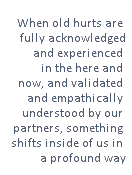|
|
Glenn Burdick, MA, LMSW
Ann Arbor, MI
How Therapy Works
Today's problems were yesterday's solutions!
 We all do the best we can to cope, feel safe, and get along in this world! Beginning in our early childhood years, we find ways to get along with others, and cope with disappointments and frustrations. Along the way we develop certain beliefs about who we are in the world. Are we lovable, capable, valued by others? There are ways we felt loved and supported by our parents or early caretakers. We all do the best we can to cope, feel safe, and get along in this world! Beginning in our early childhood years, we find ways to get along with others, and cope with disappointments and frustrations. Along the way we develop certain beliefs about who we are in the world. Are we lovable, capable, valued by others? There are ways we felt loved and supported by our parents or early caretakers.
There are also ways in which we may have felt unseen, misunderstood, perhaps not loved or appreciated in some key ways. If so we may have come to believe that we are lacking in some important way, which may make us feel ashamed and weak, and not good enough.
These are the 'wounds' of childhood, and we discover ways of coping with these very uncomfortable feelings and resulting beliefs, and they become automatic or subconscious over time. These ways of coping helped us survive difficult circumstances and feelings and were very valuable to us in our childhood. However, these very same subconscious coping devices also become our relationship problems as adults.
For instance, if you or your partner felt unfairly treated as a child, or painfully witnessed a loved one unfairly treated over time, you may as an adult find yourself very upset, even enraged, at anything that seems like unfair treatment of you by your partner.
If you felt you were unattractive or unacceptable in some way, you may be hypersensitive to your partner's seeming disapproval of your appearance or disinterest. If you felt powerless, too small or weak, you may be highly reactive to things your partner does that strike you as controlling, pushy, or one-sided , even though others don't see their behavior in that way.
You may have noticed that you overreact in such circumstances, at times seemingly out of 'the blue' and you may even have resolved to not react that way in the future. Chances are, if these reactions are due to childhood wounds, they will continue to affect your relationship, despite your best intentions, until they are healed.
These reactions arise with surprising consistency and intensity, often making us feel defensive, and causing our partner to feel defensive as well. When these feelings are present we can easily become more critical or rejecting of others.
Although these feelings are typically absent during the romantic love phase of our primary relationship, they begin to surface, much to our surprise, and our partner's dismay, after about a year or two into living as a committed couple.
We find ourself wondering what happened to the person we married, and see them as having changed in a negative way. This ushers in a phase of relationship referred to as the 'power struggle', and each couple must successfully negotiate this phase to stay together and become more intimate and secure over time. The couples that do not learn to grow past this point populate the divorce statistics.
How healing occurs
 Here's the GOOD NEWS... if, when we are experiencing one of these wounds, our partner responds to us with the proper attention, understanding and empathy, in a word, non- defensively, it actually allows these wounds from childhood to begin to heal! Here's the GOOD NEWS... if, when we are experiencing one of these wounds, our partner responds to us with the proper attention, understanding and empathy, in a word, non- defensively, it actually allows these wounds from childhood to begin to heal!
Learning to respond to a partner's upset in this way also promotes much greater intimacy, companionship and passion in your relationship. It's amazing to people how powerful this way of dealing with these reactions really is.
It is also initially quite challenging to be non-defensive in the face of such strong emotion, and nearly everybody needs coaching and support in learning to do so. To a significant degree, our personal growth and well-being really depend to on resolving these childhood wounds.
Of the various ways to accomplish this, relationship therapy really stands above the others since it heals the individual while at the same time results in a dramatically improved relationship with one's partner, including significantly increased companionship and passion.
When old hurts are fully acknowledged and experienced in the here and now, and validated and empathically understood by our partners, something shifts inside of us in a profound way. This is because the original need or want that was left unfulfilled in our childhood is presently being met by our partner.
When we are received by our partner in a way that our parents did not or could not, we can more fully accept ourself and forgive those who we felt wounded by. We can release the blocked feelings from our mind and body and experience a sense of tremendous relief, with a newfound sense of self-acceptance and freedom and the ability to participate in a wholehearted way in our intimate primary relationship
I offer relationship and marriage counseling and individual therapy in Ann Arbor, MI. If you have specific additional questions about my services please email me at , or click on the Contact menu item. If you are ready to enter relationship or individual counseling at this time, please call me at 734-395-2122 for a free 10 minute phone consultation in which we can discuss the way in which my services can make a difference in your life, and to schedule an initial appointment.
|

|
|

|
|
